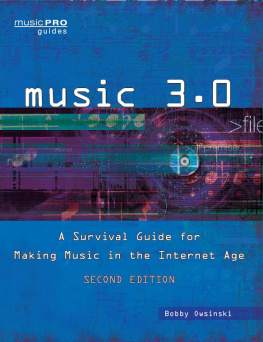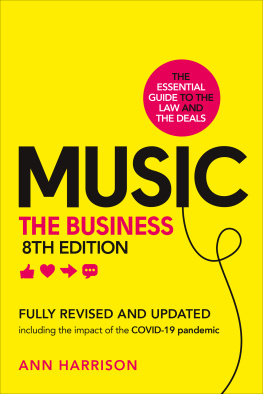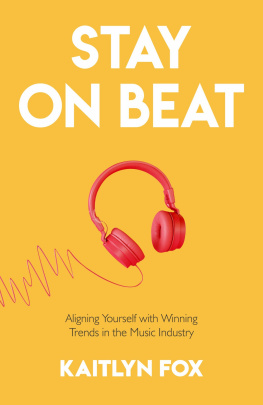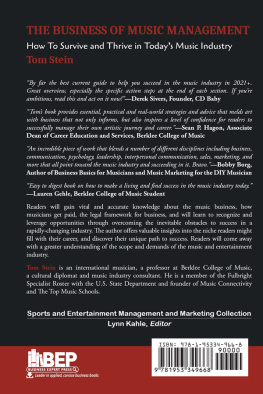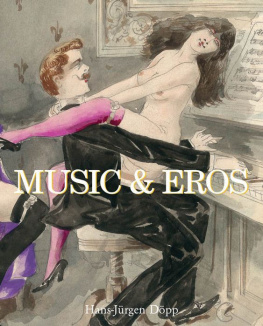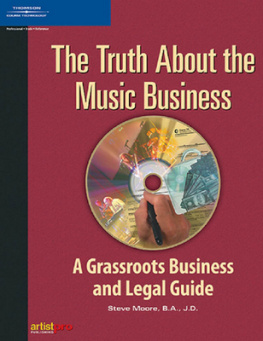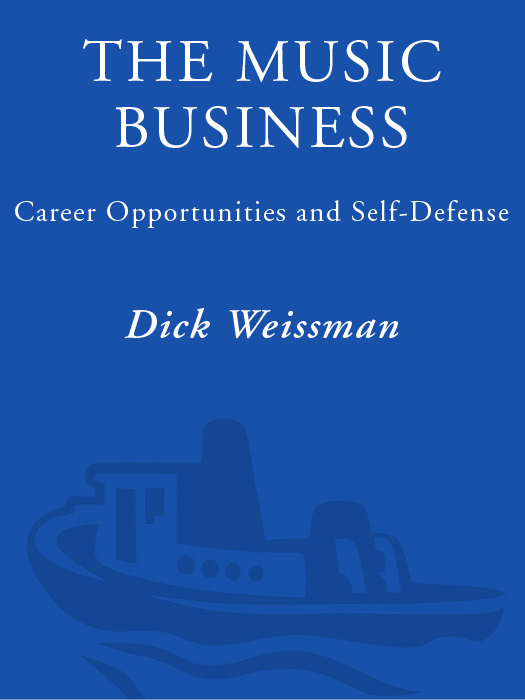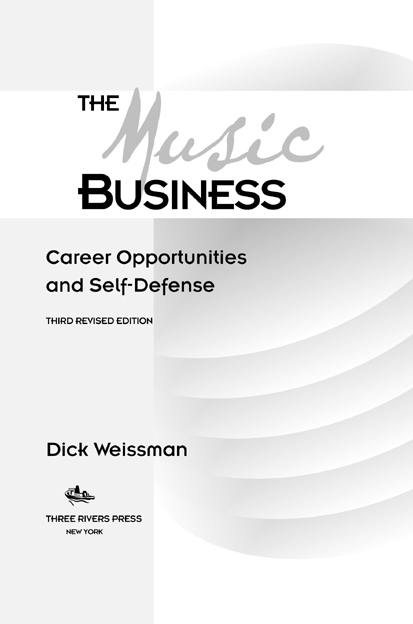ALSO BY DICK WEISSMAN
The Folk Music Sourcebook (with Larry Sandberg)
Audio in Advertising (with Ron Lockhart)
Music Making in America
Making a Living in Your Local Music Market
Creating Melodies
Songwriting: The Words, the Music, and the Money
Whats Going On: Current Issues in the Music Business (with Frank Jermance)
Copyright 1979, 1990, 1997, 2003 by Dick Weissman
Chapter 37 copyright 1997, 2003 by Frank J. Jermance
All rights reserved. No part of this book may be reproduced or transmitted in any form or by any means, electronic or mechanical, including photocopying, recording, or by any information storage and retrieval system, without permission in writing from the publisher.
Published by Three Rivers Press, New York, New York.
Member of the Crown Publishing Group, a division of Random House, Inc.
www.randomhouse.com
THREE RIVERS PRESS and the Tugboat design are registered trademarks of Random House, Inc.
Originally published by Crown Publishers, a division of Random House, Inc., in 1979. A first revised edition was published in 1990. A second revised edition was published in 1997.
Library of Congress Cataloging-in-Publication Data
Weissman, Dick.
The music business : career opportunities and self-defense / Dick Weissman.3rd rev., updated ed.
1. MusicVocational guidance. 2. Music tradeUnited States.
I. Title.
ML3790 .W4 2003
780.2373dc21 2002028694
eISBN: 978-0-307-78896-2
v3.1
Contents
PART ONE / THE MUSIC BUSINESS
Records, Agents, Managers, Music Publishing, Commercials, and Unions
31. Piano Tuning, Instrument Repair, Music in the
Armed Forces, Church Music, and Careers in Law
Introduction, or How I Got into the Music Business and Why I Wrote This Book
W HEN I was seven years old and my brother was eleven we started out together to take piano lessons. He was a more serious individual than I, and my parents assumed that he would take lessons and I would tag along. It turned out that he was virtually tone deaf, so he quit after a couple of weeks, and I ended up taking piano lessons for about seven years. We lived in northwest Philadelphia in a section called Mount Airy, and every Tuesday I would take the railroad train downtown for my lesson. I played classical music only, and all of the music was written. There was no improvisation. I played the Mozart Sonata no. 3, scales and exercises, and so on. I never had any idea about what chords I was playing or any other aspect of music structure. I would practice each piece until I had learned it reasonably well, and then go on to the next one. By the last year of my lessons I had reduced them to every other week, and had pretty much given up practicing.
About the same time that I gave up on the piano I heard Pete Seeger play the banjo. This was in 1948, and I was thirteen years old. I had never heard of American folk music, and found it kind of intriguing. At that time the music that was played on Philadelphia radio was a boring collection of insipid love songs, performed by such musical luminaries as Vaughn Monroe, Patti Page, Doris Day, and Guy Mitchell. Soon after this, 78 rpm records were phased out, and I discovered an army-navy surplus store that sold 78s by Pete Seeger, Brownie McGhee, Lonnie Johnson, Woody Guthrie, and other folk and blues singers. I bought quite a few of these records at about a quarter a record, and through reading the liner notes of one album I sent for Pete Seegers book, How to Play the 5-String Banjo.
At this point I was going to an academically oriented and boring high school in Philly called Central High. I hated it so much that I went to summer school so that I could graduate in three and a half years. I decided not to go to college right away because I felt tired of school. I got a job running a mimeograph machine in a downtown department store. Sometime during that year (1951) I bought Pete Seegers first LP, Darling Corey, a 10-inch LP for Folkways Records. I used to listen to that record every night before going to sleepin fact, to this day it is the only LP that I have ever worn out. Under the spell of the book and the record I decided to go out and buy a banjo. Following Petes instructions, I went to a pawn shop and bought a banjo for $25. I took it home, breathless with excitement, and proceeded to break two of the strings while trying to tune them to the piano. I had never seen anyone tune a stringed instrument before and didnt know how to match the pitch to the piano. I took the banjo and put it in a closet. It stayed there for about a year and a half.
A year later I entered Goddard College, a small progressive college in north-central Vermont that had no marks, no tests, and almost no students. I met a girl there named Lil Blos, who played the banjo, and she offered to show me how to play. That Thanksgiving I went home to Philadelphia and got the banjo.
For the next two years I played the banjo almost incessantly, much to the discomfort of anyone within earshot. One friend of mine used to refer to it as the tin can with strings. I was quite ruthless about my practicing, sitting in front of the campus community center playing hour after hour, destroying the peace of the Vermont countryside by playing in the woods, and dragging the banjo to parties and picnics. At no time during this period did I decide to become a professional musician. My interests were in the social sciences and literature, and my dream was to write the Great American Novel. I had a friend named Burrill Crohn who played the trumpet, and he and I started jamming, with me playing piano. Burrill played blues and Dixieland jazz. I had never played any piano without reading music, but I had learned how to play the banjo without any written music at all. I managed to find a couple of jazz piano books, including one by Mary Lou Williams that included helpful hints about chord structure.
By the time I was ready for my junior year of college, I realized that I didnt want to stay at Goddard for four years. At that time it was very difficult to transfer credits because Goddard was not yet accredited by the regional accrediting association. I arranged to divide my junior year between New York and New Mexico. In the fall I went to the New School for Social Research in New York, and in the spring I went to the University of New Mexico. As part of my fall plan, I persuaded Goddard to agree to my taking six credits of banjo and guitar lessons. I remember the registrar writing me a very serious note saying that these credits might not be applicable to a graduate school transcript should I go on for an advanced degree. Since I am now teaching both banjo and guitar for college credit at Colorado Womens College, and there are guitar programs at almost every major American college, it seems funny in retrospect. In those days guitar was considered a bit suspect in the American academic world, and banjo was not recognized as an instrument worthy of serious study.
I took four months of banjo and guitar lessons from Jerry Silverman at the Metropolitan Music School in New York City, and I also had some theory and ear-training classes. In the spring I went on to Albuquerque and took some sociology and anthropology classes. I also met a marvelous banjo player named Stu Jamieson, who lived in the nearby Sandia Mountains. I spent two long evenings at his house listening to him play, and I did a number of goofy things in Albuquerque, such as playing on KOB-TV in Albuquerque with Glen Campbells uncle, Dick Bills, dressed in full but borrowed cowboy regalia, and a couple of concerts at the university. When I returned to Goddard for my senior year I started work on my senior thesis, which combined sociology and what is now called black studies (but was then called Negro history) with my interest in folk music. It concerned the relationship between the life and the music of Huddie Ledbetter (Leadbelly), the black folksinger-composer. Mostly I focused on a content analysis of the lyrics of his songs.


